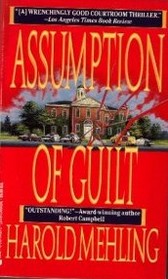The quiet town of Hudson Ferry, which its residents see as a refuge from the turbulence of big-city life, is rocked by the news that Laurie Coles, a teacher at the Snug Arms Nursery School, has been charged with sexually molesting four- and five-year-old children. The prosecutor is district attorney Peter Harmon, graduate of Harvard Law School, whose housemate, Serena Wiley, also a lawyer, shares his interest in the case. The court-appointed defense attorney is Harry Hull, a beer-guzzling, meat-and-potatoes lawyer with little experience in criminal law. It's an open-and-shut case, and Harry takes it knowing that his job is simply to go through the motions so that Judge Mathes can ensure a quick conviction. He begins to dig deeper, however, when it becomes clear that Mathes, known as "the hangman," has no intention of giving Laurie a fair trial. The author clearly knows law from the inside, and provides a multitude of perspectives--parents, jurors, lawyers, even a few courtroom buffs--in order to depict the complexities of the case. This taut and topical legal drama, filled with convincing details, is a terrific read.
When charges of sexual abuse at a local nursery school spread through the small upstate New York town of Hudson Ferry, the outraged citizens are nearly unanimous in their belief that the accused party is guilty. Young teacher Laurie Coles insists that she is innocent; her lawyer, Harry Hull, has little experience in criminal law. In his first novel, nonfiction writer Mehling breaks new ground in the legal-thriller subgenre by eschewing any statement about the defendant's guilt or innocence. Instead he focuses on the process of the trial and the conflict between the public will and the law. The plot follows the course of events, revealing not only the strategies employed by the defense and prosecution, but illuminating the characters'--including the jury members'--personal involvements as well. Challenging readers to make up their own minds about Coles's guilt or innocence, Mehling presents a vivid and realistic portrait of the law being applied in a case where truth is neither simple nor readily ascertainable. A dramatic conclusion wraps up the sometimes halting narrative, which is nonetheless an intelligent inquiry into the role of the justice system in the age of information.





